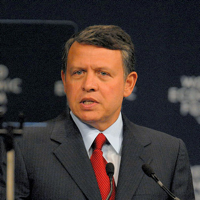One of the more curious aspects of the popular revolts unfolding in the Middle East is how much better monarchies have fared in the turmoil than have other unelected regimes. The region has long been ruled by a wide assortment of kings, emirs, retired military men, successful coup leaders and their sons. All of them came to power without the benefit of true democratic elections, even if they occasionally summoned their people to the polls. Despite that crucial similarity, the uprisings commonly known as the Arab Spring have followed remarkably different paths for monarchical regimes than they have in countries ruled by nonroyals.
Until now, the Arab uprisings have succeeded in peacefully overthrowing two presidents, Tunisia's Zine el-Abidine Ben Ali and Egypt's Hosni Mubarak. It took armed rebellion and ultimately war along with foreign help to oust Libya's Col. Moamar Gadhafi. In Syria, President Bashar al-Assad's crackdowns against mass demonstrations have so far resulted in thousands of deaths, with no end in sight. Similarly, in Yemen, protests and violence continue, with both President Ali Abdullah Saleh and his opponents defiantly holding their ground. In all of these countries, none of which are monarchies, the protesters' goals have always been to depose the rulers and bring an end to the unelected regime. Rulers have either folded early, as happened in Cairo and Tunis, or they have violently fought back.
By contrast, demonstrations in Morocco and Jordan, from their earliest days, called for democratic reforms, not for overthrowing those countries' kings, both of whom very quickly agreed to engage in a process of concerted political change. Similarly, protests in the Gulf emirates, also governed by hereditary rulers, did not call for toppling regimes, only for a greater degree of political participation and freedom, as well as an end to corruption and cronyism.

